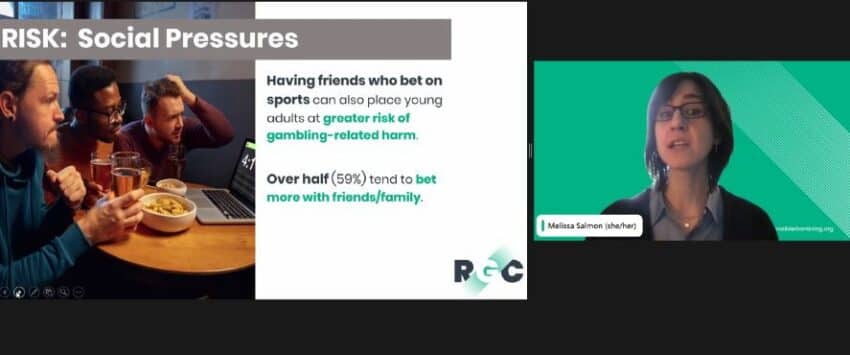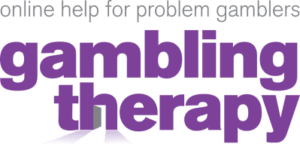
The Responsible Gambling Council, an independent non-profit organization based in Toronto that’s a leader in the prevention of problem gambling in Canada and globally for the past 40 years, hosted an educational webinar on Wednesday afternoon to give participants a preliminary introduction to the topic of sports betting with a focus on young adults.
The 30-minute webinar — which targeted professional staff and representatives from college/university campuses, community agencies, and other organizations with a limited understanding of sports betting who work with young adults in the areas of health services, residence life, peer education, and mental health — enlightened participants on the basics of sports betting, the risks associated with sports betting, who is betting on sports, and the implications of sports betting for those who work with young adults.
Wednesday’s session was led by RGC’s Senior Researcher, Dr. Melissa Salmon, and Associate Director Lisa Couperus.
After giving participants a brief rundown of what sports betting is and the different types of bets that can be made, Salmon spoke about the recent expansion of online gambling and sports betting in Ontario and the subsequent advertising boom that’s associated with it. Exactly 83% of participants in the webinar reported in an online poll that they had never previously placed a sports wager, so this basic breakdown of sports betting was likely very educational for the audience.
Salmon then revealed some interesting RGC data surrounding who is betting on sports. Single men between the ages of 18-24 that are educated, and tech savvy, represent the biggest demographic of sports bettors. She added that many adults who bet on sports falsely believe that if they have enough skill, knowledge, or invest enough time researching game outcomes, they will win wagers. She called this phenomenon an “illusion of control” and stated that research suggests 54% of young adults hold these illusions of control while placing sports wagers.
A discussion also took place about the potential gambling harms of in-game wagering. RGC research suggests that 58% of young adults intend to, or already are, placing live sports bets.
“Live betting facilitates faster speeds of play, with fewer opportunities for breaks,” Dr. Salmon said. “This is encouraging young adults to be more impulsive. According to our recent survey, over half of young adults polled said they had planned to make multiple live wagers during the Super Bowl this year.”
The RGC says other problem gambling risk factors also include engaging in multiple types of gambling (online casino, poker, lottery, etc.) in addition to sports betting, as well as holding accounts with multiple operators and frequently using gambling promotions offered by these operators. Mixing the use of cannabis and/or alcohol with gambling is also a huge red flag.
Dr. Salmon also stressed that sports betting is a social activity, which can lead to increased gambling practices if any given person’s inner circle of friends and family are also engaging in this behaviour.

Sports betting and postsecondary campuses
The webinar concluded with a recommendation from RGC staffers to college and university health promotion programs, and residence life and student associations, to boost awareness and support for students that could be at risk, or are experiencing, problem sports gambling. Many postsecondary institutions already have established programs and support systems in place for students experiencing alcohol and drug use, but gambling should be included in that spectrum.
“Gambling is one of those issues that’s difficult to see. It’s not like the harms that are associated with alcohol and drug use that are easy to recognize,” Couperus said to nearly 20 representatives from Ontario universities and colleges during the webinar.
Responsible gambling messaging could also be included in the health and safety social media campaigns of various postsecondary institutions across Ontario. Collaborating with problem gambling organizations (like RGC) and inviting them to campus events could also boost awareness and help provide support to students struggling with gambling addictions.
Couperus also recommended that students involved in school athletic programs should also be educated on the potential harms associated with sports wagering.

“RGC has delivered prevention education programs to the young adult demographic for close to two decades,” Couperus explained to Canada Sports Betting. “While our focus with this webinar was about connecting directly with the 18-24 age group, we have expanded our strategy to build capacity within the college/university staff administration, a group who we know is already spread quite thin trying to deliver information, resources, and support across a number of student health issues. Our goal is to support all those working with this high-risk population with the knowledge, tools, and resources for gambling harm reduction.
“This webinar was a test for us to gauge content needs and interest from this tough-to-engage group and we were quite pleased with the interest and attendance.”
Ontario’s college and university campuses are literal breeding grounds for new sports bettors. Many students turn the legal gambling age of 19 while they’re attending these institutions and have a keen interest in sports and athletic programs being offered on campus. Like many residents of Ontario and Canada, this population of young adults is also being subjected to a huge increase in sports betting advertisements through mainstream media channels.
Ontario’s regulated iGaming market launched on April 4 of last year and is closing in on its one-year anniversary. Gamblers in Ontario wagered $11.53 billion and the market produced $457 million in total gaming revenue — from iCasino, online sports betting, and online poker — for the period of Oct. 1-Dec. 31, 2022, according to the Fiscal Year Q3 report released by iGaming Ontario.
